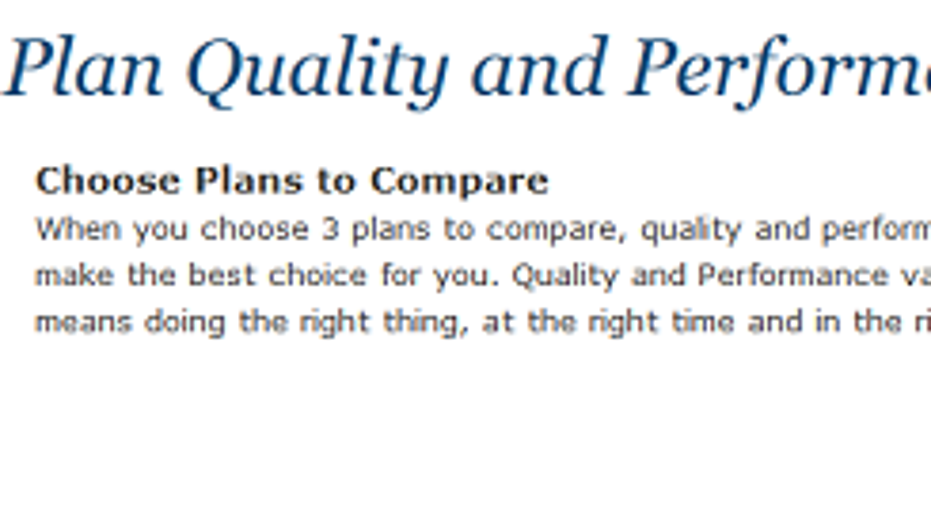What Medicare Advantage Star Ratings Mean (And Why They're More Important Than You Think)

Image: Medicare.gov.
Medicare Advantage has become increasingly popular in recent years, and about a third of all Medicare participants use Medicare Advantage plans for their coverage. Recently, Medicare has rolled out a star-based ratings system to judge various plan providers. Even though those ratings are meant to be helpful for participants seeking a Medicare Advantage plan, they also have huge financial implications for the companies that provide those plans.
What Medicare Advantage's star ratings really meanThe idea behind the rating system is simple. Medicare assigns between one and five stars to each plan, with one star representing poor plans and five stars being excellent.
Medicare Advantage plans generally get judged on five criteria. Good plans feature membership bases who take advantage of wellness services like screenings and tests designed to keep them healthy. They help members manage long-term chronic conditions effectively. Member satisfaction is an important attribute of a good Medicare Advantage plan, and Medicare also looks at complaints about plans as well as any positive or negative trend in its performance. Finally, customer service plays a vital role, especially in how a plan handles disputes and appeals about coverage.
In addition, some Medicare Advantage plans include prescription-drug coverage, and Medicare evaluates four similar criteria dealing specifically with that area. Medicare judges customer service in handling appeals, member satisfaction ratings with plans, and the number and type of complaints surrounding a plan. Medicare also looks to the safety of the drugs covered and the accuracy in pricing of those drugs to assess whether a plan is doing a good job.
Each of those broad criteria has specific elements a plan needs to meet to get a good rating. You can see the full list of things that Medicare looks at on this page at the Medicare website.
Why ratings matterObviously, a high rating gets more people interested in a plan. That in turn tends to be positive for the provider of that plan, because economies of scale can improve efficiency and result in greater profits.
But there's also a more direct financial benefit to having a high rating. Medicare provides additional incentives to plans that earn four, four and a half, or five stars. Before 2015, Medicare also paid bonuses to three-star and three-and-a-half-star plans, but that changed last year. The incentives are substantial, amounting to roughly $500 per member by some estimates. For UnitedHealth Group and Humana , that adds up to around $1.4 billion to $1.5 billion each, according to analyst estimates reported by USA Today.
However, when a plan's rating takes a hit, a company that has relied on the bonus revenue can suddenly suffer a major financial problem. In January, Cigna got sanctioned by Medicare for allegedly not providing members with required benefits. The cost could exceed $250 million in lost bonuses for next year if Cigna can't fix problems in time and therefore loses its star ratings.
To maximize the value of incentives, Medicare Advantage plan providers have taken steps to bolster the member-counts on their highest-rated plans. In some cases, providers that have two separate contracts covering different areas can shift members from unrelated plans in one area into a high-rated plan in another, boosting their bonuses. The financial rewards can also help plans reduce their premium costs to subscribers, creating a positive feedback loop that then makes those favored plans look even more attractive to new enrollees. Given that so many Medicare Advantage participants seek out low-cost plans as their primary goal, anything that providers can do to keep their premiums down and their benefits strong gives them a competitive advantage over other providers.
Medicare Advantage has risen in popularity, and the star-rating system has become a key component of the program as a whole. By understanding the ramifications of ratings on your Medicare Advantage plan and the company that provides it, you'll be better able to choose the best plan for your individual needs, both in terms of quality and price.
The article What Medicare Advantage Star Ratings Mean (And Why They're More Important Than You Think) originally appeared on Fool.com.
Dan Caplinger has no position in any stocks mentioned. The Motley Fool recommends UnitedHealth Group. Try any of our Foolish newsletter services free for 30 days. We Fools may not all hold the same opinions, but we all believe that considering a diverse range of insights makes us better investors. The Motley Fool has a disclosure policy.
Copyright 1995 - 2016 The Motley Fool, LLC. All rights reserved. The Motley Fool has a disclosure policy.



















